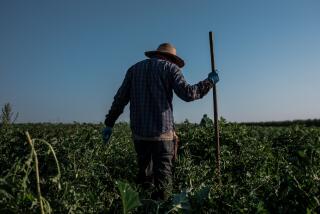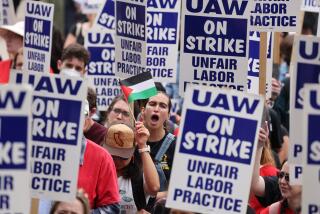Grower Awarded $1.6 Million in UFW Suit
- Share via
An Imperial County Superior Court judge has notified the United Farm Workers Union that it must pay Maggio Inc., a large Imperial Valley vegetable grower, nearly $1.7 million in damages for losses Maggio suffered as a result of violence during a 1979 strike.
This is believed to be the largest judgment ever rendered against the UFW, and a lawyer for the union acknowledged that it would represent a serious financial burden if upheld. She said the decision will be appealed.
The notice of intended decision by Imperial County Superior Court Judge William E. Lehnhardt was made public on Monday. A final decision, including slightly more detail, is expected in about a month, according to Jay Jeffcoat of Gray, Cary, Ames & Fry, the San Diego-based law firm that represented Maggio in the case.
Lehnhardt’s decision stems from a violence-marred strike that began in the Imperial Valley in January, 1979, and lasted through the early summer. During the strike, Rufino Contreras, a UFW striker, was killed by an unknown assailant, several other pickets were wounded by gunfire and another was injured when struck by a pickup truck.
During a long trial, Maggio’s lawyers presented videotapes showing large numbers of strikers rushing into the fields carrying clubs and throwing rocks at strikebreakers and farm vehicles. In May, the judge ruled that the union was responsible for the violence.
UFW lawyers had asserted that the violence was started by the growers and by private security guards and gun-toting field workers they had hired. “The bottom line is that the rock throwing started only after the strikers were run down, shot at and otherwise provoked,” UFW lawyer Hermil Moreno said.
But Lehnhardt rejected this argument. He said there was “clear, unequivocal and convincing proof” that the union “authorized, participated in and ratified regular, consistent and repeated” acts of violence.
The damages phase of the trial began in June. Lehnhardt’s notice of intended decision said that Maggio “is entitled to damages for crops it reasonably could have expected to harvest during the strike year by using strike-year prices.”
He said that the company is entitled to $907,053 for lettuce losses, $493,973 for broccoli losses and $161,468 for carrot losses. He said the union also owes Maggio $3,342 for property damage, $100,135 for security expenses and $13,675 for housing costs it incurred, coming to a grand total of $1,679,646.
Maggio had asked for $1.9 million, but attorney Jeffcoat said the company was “pleased with the result.” He said evidence introduced at the trial raised serious questions about the union’s attitudes about violence. “It was very much a picture of everyone closing their eyes and ears” to violent acts, Jeffcoat said.
Cesar Chavez, president of the UFW, has always maintained that nonviolent protest is the union’s most potent weapon and once called off a strike that threatened to become violent.
UFW lawyer Ellen Eggers said she was “absolutely shocked and amazed” by the magnitude of the award. She took issue with the original ruling of liability, saying that there was no proof that union leaders condoned or participated in violence.
She also asserted that the damage award is excessive, even assuming that the union is liable. Eggers contended that it was improper for the damage award to be based on “strike inflated” prices for unharvested crops rather than a five-year average of prices that the union had presented at trial.
Wife Worked for Grower
“I thought the judge could be objective even though his wife was a scab for the Maggio company,” Eggers said. She referred to the fact that Lehnhardt’s wife had worked briefly as a non-union packer during the strike. Earlier, the union had unsuccessfully sought to disqualify Lehnhardt, alleging conflict of interest.
Jeffcoat said Maggio intends to “aggressively” pursue collection of the judgment, including possibly attaching union dues and money in the UFW treasury, or attempting to seek control of union-owned property. He said the union will have to post a substantial bond (1.5 times the amount of the judgment) in order to appeal.
Eggers acknowledged that pursuing the appeal would definitely create financial problems for the UFW. “It’s going to be a lot of money and it can’t help but affect the normal operation of the union,” she said.
More to Read
Inside the business of entertainment
The Wide Shot brings you news, analysis and insights on everything from streaming wars to production — and what it all means for the future.
You may occasionally receive promotional content from the Los Angeles Times.










